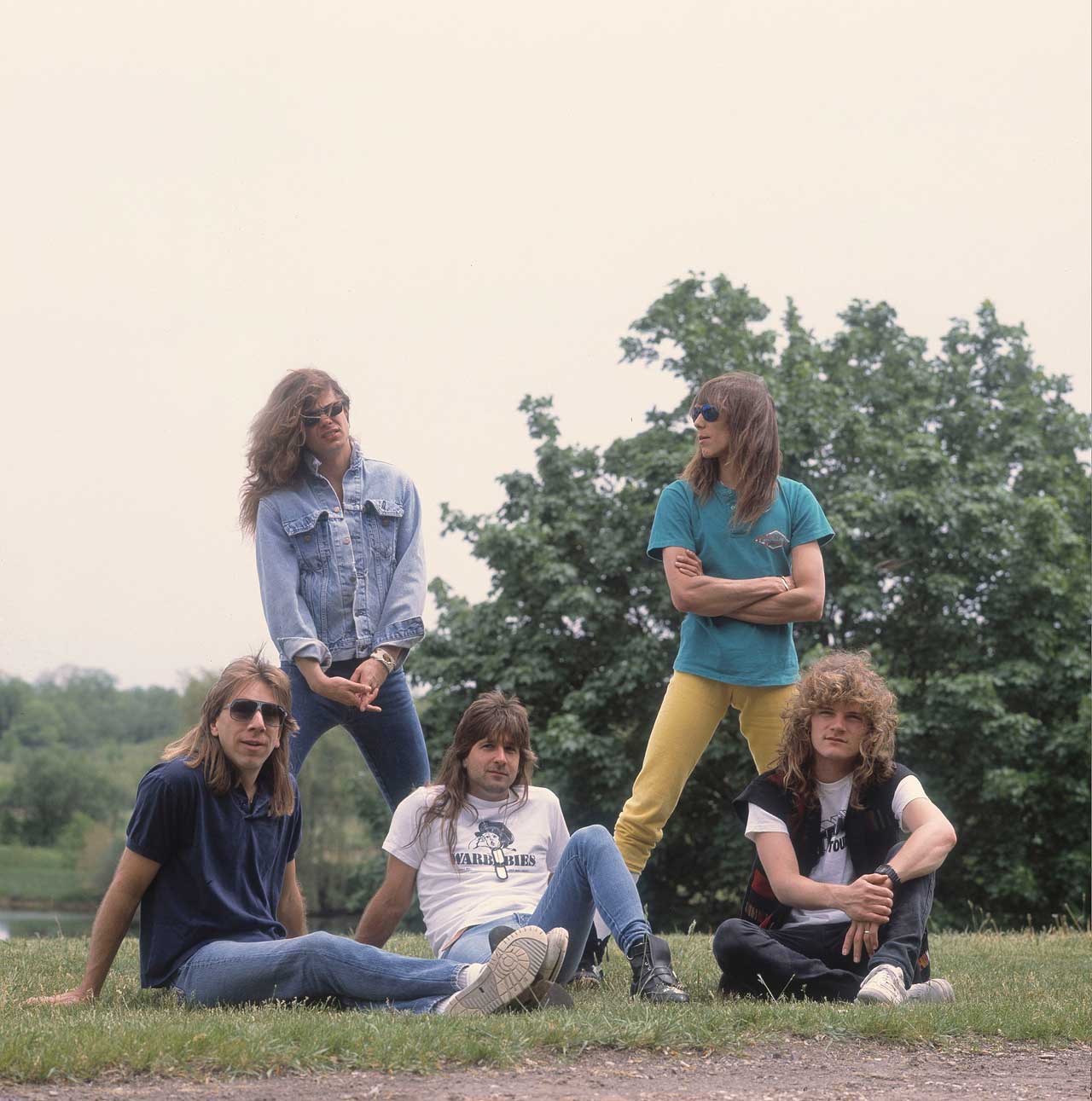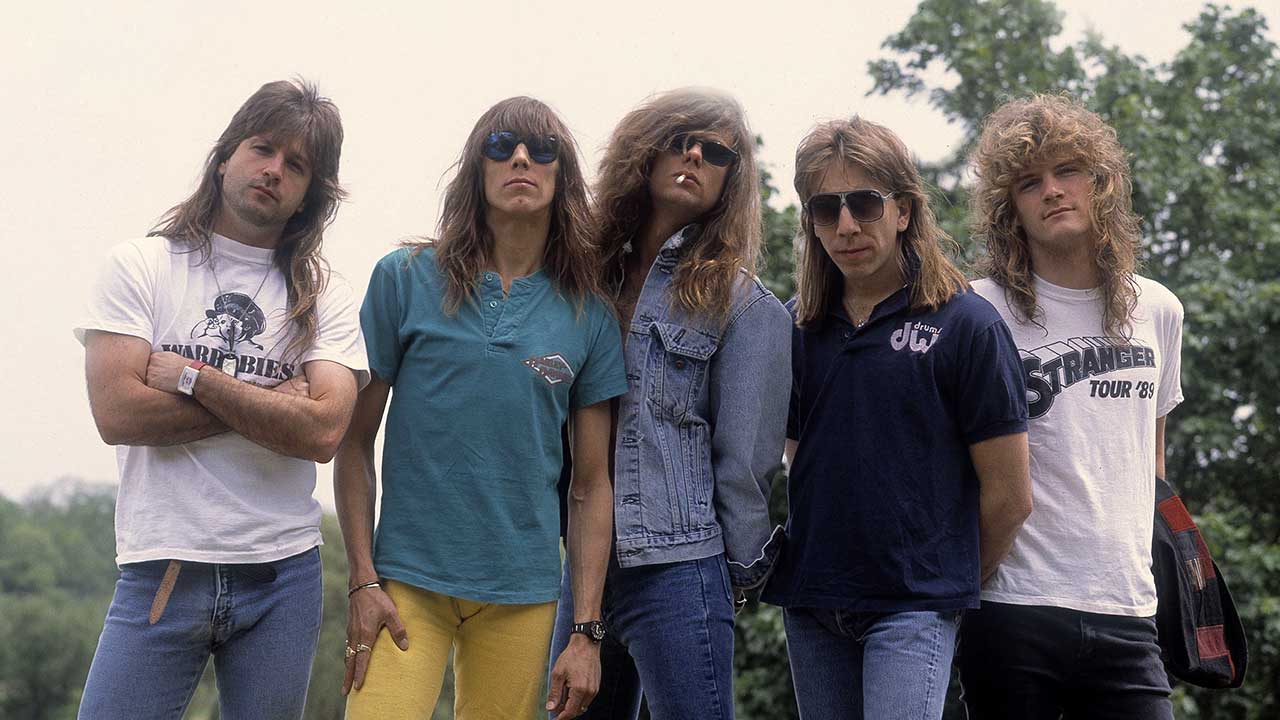There are many ways to find fame through music. The annals of rock are full of acts that stood out from the crowd by playing excessively fast (Metallica) or slow (Black Sabbath), by sporting outlandish clothes (Kiss) or wearing nothing at all (Red Hot Chili Peppers). Others became known for standing on one leg (Jethro Tull’s Ian Anderson) or setting their head on fire (Arthur Brown).
At the other extreme are those who eschew gimmickry and simply let their music do the talking. Tesla fall into the latter category. Perhaps the most outlandish thing that these five working-class kids from Sacramento ever did was adopt the name of Nikola Tesla, the so-called ‘mad scientist’ whose inventions include radio and fluorescent lighting. It was a fitting choice, as Tesla (the band, that is, not Nikola; apparently he wasn’t very musical) went on to sell millions of albums during the late 80s and early 90s, even winning the admiration of their hero Jimmy Page before succumbing to the grunge-rock revolution and their own internal short-circuits.
Brian Wheat was playing bass with a garage group called Rage when, in 1982, he heard whispers of a hotshot local guitarist called Frank Hannon. Despite being three years younger than 18-year-old Wheat, Hannon was invited along to jam. “I thought Frank had been touched by God,” Wheat enthuses. “So everybody got fired and we started a whole new band.”
Adopting the name Earthshaker, after an album by fellow Californian hard rockers Y&T, Hannon and Wheat began dusting down and working up an early repertoire of UFO, Def Leppard and Scorpions covers. Along with guitarist Tommy Skeoch (who was poached from a rival group) and singer Jeff Keith, Earthshaker evolved into City Kidd. Keith was a raw but potentially gifted frontman. Due to his inexperience he came perilously close to be being passed over after jamming at a City Kidd club show.
“Jeff had never used a monitor system before,” Wheat recalls, “so he was holding the mic four feet from his face and there was all this ugly feedback.”
“But standing next to Jeff and hearing how great he was, I fought his corner,” Hannon adds. “I’m so thankful that we gave him that chance as, next to Steven Tyler, he’s the greatest singer in rock’n’roll.”
City Kidd would play the Oasis Ballroom in Sacramento many times, but it was a three-month booking at a US Army base on the Pacific island of Guam that really knocked them into shape. The band wrote Cumin’ Atcha Live and other songs that would appear on their first album, while they played five sets a night for the troops.
Their earliest manager, Steve Clausman, then persuaded Ronnie Montrose (who had played guitar with the Edgar Winter Group, Montrose, Gamma) to attend a show. “As a 16-year-old I was overwhelmed even to meet Ronnie Montrose, let alone play for him,” Hannon says. “But he liked what he saw and immediately took us into the studio.”
In the summer of 1984 the band addressed Clausman’s reservations regarding Robert Contreras, their drummer of the past three years. Newcomer Troy Lucketta brought vital recording experience, having played with future Mr Big singer Eric Martin in the recently imploded Eric Martin Band.
Great White singer Jack Russell, who’d seen the quintet open for his band, told Tom Zutaut (the talent scout who’d signed Motley Crue and would later follow suit with Guns N’ Roses, among many others) of “these incredible young kids from Sacramento”. Zutaut saw the band live, and after a pep talk – they were instructed to stop striving for hits and write from the balls instead – promised them a recording contract if they’d wait until mid-1985 when he took up a new position at Geffen Records.
But despite signing a new deal with Q Prime, the heavyweight management company that represented Def Leppard, Metallica and Queensrÿche, City Kidd struggled to find a producer for their album. “Rick Rubin, Max Norman, Peter Collins and Bruce Fairbairn all didn’t like us,” reveals the puzzled Wheat. So there was an element of desperation when Zutaut brought Steve Thompson and Michael Barbiero (a duo who’d worked in dance music; they would end up mixing GN’R’s Appetite For Destruction) to a live show.
“Even they tried to weasel out,” cackles a disbelieving Zutaut. “But I managed to convince them that this was a band that would sell a million records.”
Boosted by prime support slots with the newly solo David Lee Roth and then Alice Cooper, and aided by having a minor hit with Modern Day Cowboy, that’s exactly what happened. By the time they released the Mechanical Resonance album in mid-1986, City Kidd had changed their name to Tesla, in honour of the aforementioned Serbian scientist.
Hitching a ride on Def Leppard’s 18-month Hysteria world tour helped to push sales of Mechanical Resonance past the million mark.
- Tesla: the story of Five Man Acoustical Jam
- The story behind Def Leppard's Hysteria album artwork
- Hey! Guns N Roses! We've fixed Use Your Illusion!
- The Strange And Terrible True Story Of Great White
An equally unpresumptuous yet very hummable set of tunes, 1989’s The Great Radio Controversy outperformed its platinum-selling predecessor by two to one, the Top 10 ballad Love Song smoothing its path to No.18 in the US. Snubbing the trend of staging lavish shows, Tesla then played a series of unplugged dates, and recorded one in Philadelphia for the album that became Five Man Acoustical Jam. Besides stripped-down renditions of their own songs, Tesla played tunes by the Grateful Dead, Creedence Clearwater Revival, The Rolling Stones and The Beatles; they notched up another Top 10 hit with a cover of Five Man Electrical Band’s Signs.
Tesla had another million seller on their hands, and Wheat admits that the success started to affect the band’s outlook.
“All of us came from nothing, and all of a sudden there were chicks and people wanting your autograph. You started to believe your own hype,” he says. “There was also some drug stuff which contributed to our eventual break-up.”
Proof of Tesla’s growing status came when Jimmy Page declared his admiration of Five Man Acoustical Jam. “I met Jimmy backstage when David Lee Roth played Hammersmith Odeon,” Wheat recalls. “When he said: ‘People are talking about Clapton’s acoustic album, but yours was the first. I really love it,’ that was one of the greatest moments of my life.”
Wheat quips that 1994’s Bust A Nut, should have been titled Bustin’ Up. “It’s an underrated record, but the writing was on the wall,” he says. “The band was fucked up – mentally, physically, everything. Jeff and Tommy were in really bad shape. And with the success of Nirvana, the record label was changing. We were no longer the darlings of radio. We couldn’t keep it together.”

Bust A Nut sold 800,000 copies, a Tesla album falling short of a million for the first time. When Tesla and Geffen Records agreed to part, the band received a windfall of five million dollars.
“We were rich. Maybe we didn’t give a fuck about each other any more,” Wheat exclaims. “A lot of cocaine was being taken which made things worse.”
Hannon: “A certain band member wrote off a couple of vehicles, sometimes becoming so fucked-up they couldn’t up get off the floor.”
Wheat had married Sandi Saraya of the band Saraya, and he wasn’t the only member of Tesla to take a bride. Soon matrimonial matters began to intrude on the group’s affairs.
“There was a band meeting that one of us couldn’t attend – I won’t name him – so he sent his wife instead,” chuckles the bassist. “It’s why we have a ‘No Yoko’ clause in our contracts these days. I’m not kidding.”
Label-less, and left to their own devices by Q Prime, Tesla drifted apart in 1996. Wheat formed Soulmotor with former UFO guitarist Tommy McClendon (better known as Atomik Tommy M), while Keith and Skeoch worked together in Bar 7. At one point the singer was forced to supplement his income by dee-jaying at a local strip club.
“Some of us went through harder times than others,” Wheat muses, “but being apart made us better people. At least it made four of us appreciate what we had, although someone just didn’t get it.”
Tommy Skeoch had been kicked out of the band a year before their implosion but was showing little sign of winning his battle against his addictions. From the outside, at least, all seemed fine when a local radio personality persuaded the original five-piece to reconvene and they played a sold-out show at Sacramento’s ARCO Arena in October 2000. The following year’s RePlugged Live double concert album was followed by 2004’s studio record Into The Now. Creative sparks flew, and it sold a respectable 250,000 copies, but old problems remained. “We were still getting fucked up on the reunion tour, and Jeff took some slagging for that,” admits Wheat. “But Into The Now was a contemporary sounding record that pleasantly surprised lots of people.”
Zutaut agreed to become Tesla’s manager, and used expertise he’d gained at Geffen and various other companies to help them form Tesla Electric Company Recordings. While Jeff Keith had dealt with his issues, in early 2006 it was “mutually agreed” that Skeoch should leave to spend time with his newly born child. Amazingly, Tommy’s replacement, 28-year-old Dave Rude, was found via the internet.
“I’d been searching for several months for someone to play in my solo band, but Tesla also had a tour booked. Looking on MySpace was a desperate attempt,” laughs Frank Hannon. “Who’d have thought we’d find someone as magical as Dave that way?”
Rude debuted on Real To Reel, Tesla’s covers album of hard rock classics from the 1970s. The band are all too aware of the cynicism that generally surrounds such projects, although besides being called “hugely enjoyable” in these pages, they’ve enjoyed mostly positive feedback about their covers of songs by UFO, Robin Trower, Uriah Heep and many more.
“Covers albums can be an easy option,” Hannon acknowledges, “but we invested lots of time in the track selection and recording process. The last thing on earth that we did was to simply spit it out.”
The band unexpectedly severed ties with Zutaut, who produced Real To Reel, shortly after its release.
“As a creative A&R person and a record producer, Zute’s a genius,” says Hannon. “He’d be great in managing a young, up-and-coming band. I personally hope we’ll work again with him again in some capacity.”
With Hannon and Wheat taking up management roles, Tesla are set to record an album of original material early next year, which will be followed by a boxed set. The band’s first UK tour in 16 years also takes place this month. Expect great songs, smiling faces and not a whiff of posturing.
“So many bands think it’s cool to wear make-up, or release albums that they can never replicate live,” concludes Wheat. “We’re still about jeans, T-shirts and authentic rock’n’roll.”
Maybe that’s why after 16 years and around 15 million albums Tesla are still going strong
“We’re an honest, blue-collar band with a lot of heart and soul,” shrugs Hannon. “Our fans are hardworking, decent folks, just like us.”
The feature was originally published in Classic Rock 112.

